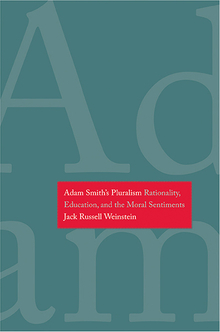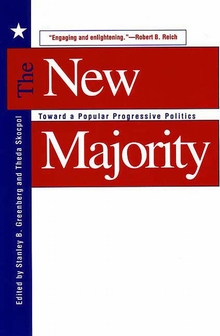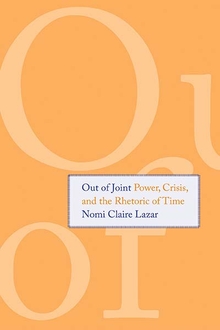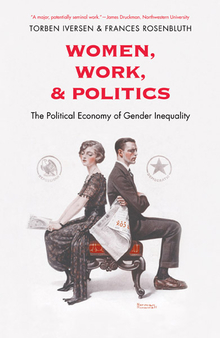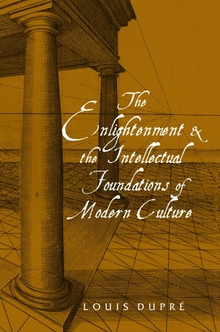Adam Smith's Pluralism
WARNING
You are viewing an older version of the Yalebooks website. Please visit out new website with more updated information and a better user experience: https://www.yalebooks.com
Rationality, Education, and the Moral Sentiments
Jack Russell Weinstein
In this thought-provoking study, Jack Russell Weinstein suggests the foundations of liberalism can be found in the writings of Adam Smith (1723–1790), a pioneer of modern economic theory and a major figure in the Scottish Enlightenment. While offering an interpretive methodology for approaching Smith’s two major works, The Theory of Moral Sentiments and The Wealth of Nations, Weinstein argues against the libertarian interpretation of Smith, emphasizing his philosophies of education and rationality. Weinstein also demonstrates that Smith should be recognized for a prescient theory of pluralism that prefigures current theories of cultural diversity.
Jack Russell Weinstein is Professor of Philosophy and Director of the Institute for Philosophy in Public Life at the University of North Dakota.
“[Weinstein’s] interpretation of Adam Smith is original in challenging both standard philosophical and economic interpretations, producing a lucid and interesting narrative.”--J. Patrick Raines, Jack C. Massey Dean of the College of Business Administration, Belmont University
"By a patient and clear analysis of the explicit and implicit elements of Smith’s notion of the ‘impartial spectator’, including the persuasive, reasoned, educative and imaginative nature of the observational processes involved in moral and other judgments, JRW’s innovative inquiry has: repositioned the relationship between all of Smith’s major works; imaginatively challenged the ‘Adam Smith problem’; emphasized Smith’s sustained educational concerns; and, by showing the ‘pluralism’ inherent in Smith’s work, restored Smith to the position of enduring moral philosopher through the specification of internal and consistent themes across Smith’s works and by illustrating significant pre-figured conceptual links to modern notions of liberalism/pluralism."--Willie Henderson, Emeritus Professor, University of Birmingham UK, International Associate of the Alworth Institute, University of Minnesota Duluth.
"Adam Smith abhorred the destructive “violence of factions”, but he fully appreciated that societies are inevitably divided into “great orders and societies” each with their peculiar interests. How can a liberal (free) society keep the latter from degenerating into the former? This is a fundamental question that Smith recognized he had to address. In this work Weinstein constructs a compelling analysis of Smith’s resolution of this conundrum in which education becomes the foundation for realizing the constructive possibilities of diversity we now refer to as pluralism. In doing so Weinstein offers Smith’s work as a valuable foundation for the modern discourse on this age old challenge: How do we realize the positive potential of E pluribus unum? Weinstein provides a compelling read with valuable insights for our collective conversation about the possibilities of today and tomorrow."—Jerry Evensky, author of Adam Smith's Moral Philosophy: A Historical and Contemporary Perspective on Markets, Law, Ethics, and Culture
“Remarkable . . . . Lays the groundwork for a multivolume project using Smith to anchor a 'twenty-first-century liberalism.'”—John Paul Rollert, Los Angeles Review of Books
“Fascinating . . . an invigorating reorientation of liberal theory. Weinstein’s rescue . . . [of] Smith's moral philosophy from its economically obsessed captors will prove an extraordinary blessing for conservative and liberal alike.”—David J. Davis, American Conservative
"Few, if any, sources probe Smith's nuanced and integrated approach to a social system with the depth of this book. . . . Smith enthusiasts will find [it] indispensable."—Choice
“Weinstein is by no means the first … to have argued for Smith’s economic theorising in the Wealth of Nations to be read through the lens of Smith’s wider moral and social philosophy contained in his Theory of Moral Sentiments. However, few others have connected the dots as well as Weinstein …. His book is to be commended to all with a serious interest in liberty and in the social and political conditions needed for it to flourish.”—David Conway, Library of Law and Liberty
"[An] engaged and engaging book . . . this book contains some nice surprises."—Eugene Heath, Journal of Scottish Philosophy
ISBN: 9780300162530
Publication Date: September 24, 2013
Publication Date: September 24, 2013
360 pages, 6 1/8 x 9 1/4

